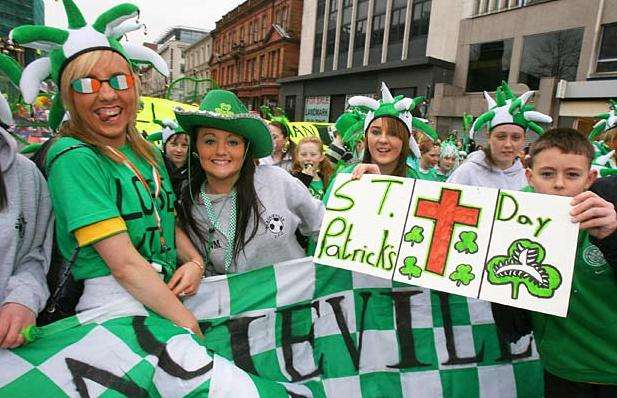(单词翻译:单击)
情景对话
Todd: So Megen we are talking about Holidays and Christmas and in the last interview we talked the difference between Christmases in a cold country and a warm country, so now I thought we would talk about Christmas in countries that aren't really Christian countries. They don't really celebrate it for religuous reasons. So we're in Japan and it's interesting that in Japan it's a romantic day, right?
托德:梅根,我们来讨论一下节日和圣诞节,在上期节目里我们讨论了在寒冷国家过圣诞节和在温暖国家过圣诞节的不同之处,现在我想我们可以来讨论一下非基督教国家的圣诞节。他们庆祝圣诞节不是出于宗教原因。我们两个人都在日本,有意思的是,圣诞节在日本是很浪漫的节日,对吧?
Megen: Yes. Yeah it is.
梅根:对,没错。
Todd: It's like Valentine's Day
托德:就像情人节一样。
Megen: Yes, you have to spend Christmas with your partner.
梅根:对,要和另一半一起过圣诞节。
Todd: Right, and everybody looks forward to it. To go out on a date and give each other gifts, and yeah.
托德:没错,所有人都很期待圣诞节的到来。在那一天去约会,互送礼物。
Megen: Yeah, yeah, I think the fireworks are for the boyfriend and girlfriend and I think, and I think there are a lot of decorations that are similar to like Valentine's actually.
梅根:对,对,有为恋人准备的烟花秀,而且还有很多类似情人节的装饰。
Todd: Yeah, it's interesting because they have the Christmas decoration everywhere, but nobody gets the day off. No families celebrate it really.
托德:对,这很有意思,因为日本在那天到处都是圣诞节的装饰,可是没有人休息。没有家庭庆祝圣诞节。
Megen: Yeah, it's a regular day.
梅根:对,那只是普通的一天。
Todd: Except eating the chicken dinner, which we talked about — the fried chicken dinner. Yeah, so it's kind of like one of those, like I call it a soft holiday. Like in America a soft holiday would be St Patrick's Day. Like everybody has to go to work but you do something that day related to the holiday even though you have no historical connection to it at all.
托德:除了吃鸡肉晚餐,我们之前提到过,日本在圣诞节吃炸鸡晚餐。那有点像我称之为的“软节日”。在美国,圣帕特里克节就是软节日。那天所有人都要上班,虽然人们会做一些和节日有关的事情,但却完全没有历史联系。
Megen: Ah, I see.
梅根:啊,我明白了。
Todd: So for example on St Patrick's Day you drink green beer and you wear green. Like, do you do that in Australia?
托德:比如,在圣帕特里克节要喝绿啤酒,穿绿色的衣服。澳大利亚也这样做吗?
Megen: Ah, that started to become a thing in Australia that the bars do tend to have green beer, and you have green clothing that you might wear and people go out. It's definitely a drinking holiday. Not a holiday though.
梅根:啊,那在澳大利亚已经成为一种流行了,酒吧会提供绿啤酒,人们会穿着绿色的衣服外出。那绝对是一个饮酒的假日。虽然那天并不放假。
Todd: Right, are there any other holidays that you've absorbed into Australia?
托德:对,澳大利亚还吸收了哪些节日?
Megen: Well, people are starting to celebrate Halloween more these days and people take their kids trick or treating.
梅根:嗯,最近人们开始庆祝万圣节,人们会带孩子去做“不给糖就捣蛋”的恶作剧。
Todd: Oh, really?
托德:哦,真的吗?
Megen: Yeah! Not everyone does it, though I think that some people like to put a sign on their front door to say that trick-or-treaters are welcome, because generally we don't do that kind of thing in Australia, but the departments, the department stores are having more decorations and it's definitely infiltrating from America I think.
梅根:对!虽然并不是所有人都会这样做,不过有些人会在房子的前门挂个牌子,上面写着:欢迎玩不给糖就捣蛋的孩子,通常我们澳大利亚不会做这种恶作剧,不过现在百货商店里有关万圣节的装饰越来越多,我认为那一定是从美国渗透进来的。
Todd: Oh, that's interesting. So, in America Halloween is a big time to have parties. Do you have parties?
托德:哦,那真有趣。在美国,万圣节是举行派对的绝佳时间。你们举行派对吗?
Megen: I think more and more people are having parties. They have their own party in their house with decorations and costumes, but it's hard to say how many people celebrate Halloween really.
梅根:现在越来越多的人会举办派对。他们在自己家里办派对,在家里进行装饰,穿上万圣节服装,不过很难说清楚现在有多少人会庆祝万圣节。
Todd: Well, what about costumes? Did you wear a costume?
托德:嗯,那服装呢?你们会穿万圣节服装吗?
Megen: I never wore a costume in Australia. I had never celebrated Halloween, but I noticed that some of my friends, and friends with children, they are celebrating it more, and it's becoming just a chance to have a party and dress up.
梅根:我在澳大利亚从来没穿过万圣节服装。我没庆祝过万圣节,不过我注意到,我的一些朋友,尤其是那些有孩子的朋友,他们会过万圣节,那天是举办派对和装扮的好机会。
Todd: As an English teacher did you dress up here in Japan?
托德:作为英语老师,你在日本有穿万圣节服装装扮一下吗?
Megen: Yes, I did actually. Twice.
梅根:有,我装扮过两次。
Todd: Oh, you did. Did you like it?
托德:哦,你穿过万圣节服装。你喜欢吗?
Megen: I did. It was fun to dress up. I dressed up as a character from a Jubilee movie, and it was really good to get together with my friends and to go out. Have you ever dressed up before?
梅根:我很喜欢。穿万圣节服装装扮一下很有意思。我打扮成了电影《庆典》里的一个角色,和朋友们聚会、一起出去玩非常开心。你以前装扮过吗?
Todd: Oh, countless times. Countless. Yeah, so as a kid it was a big thing definitely in America.
托德:哦,我装扮过无数次了。无数次。在美国对孩子来说,万圣节装扮是件大事。

译文属可可原创,仅供学习交流使用,未经许可请勿转载
重点讲解
重点讲解:
1. look forward to sth./doing sth. 期待;盼望;
例句:"I look forward to seeing him tomorrow and exchanging views with him, " he said.
他说:“我期待着明天与他见面并与他交换意见。”
2. be similar to 相像的;相仿的;类似的;
例句:The conference was similar to any that had gone before. I don't want to come again.
会议与以往的差不多,我再也不想来了。
3. even though 即使;尽管;纵然;
例句:Even though your research appears to be at a dead end now, you shouldn't lose heart but keep on trying.
即使你们的研究现在似乎没有什么进展,你们还是不应该泄气,而要继续进行下去。
4. dress up 装扮;打扮;
例句:Little girls dress up as angels for fiestas.
小女孩们在节日里扮成天使的样子。


